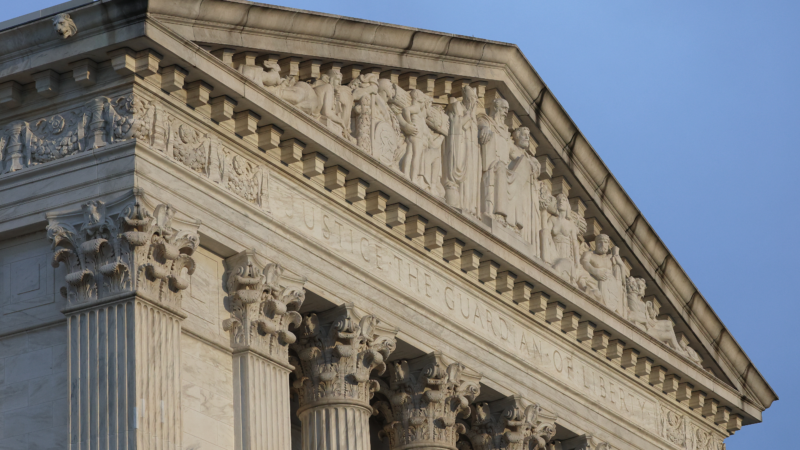Supreme Court lets Trump move forward with firing thousands of federal workers
The U.S. Supreme Court on Tuesday allowed the Trump administration’s firing of 16,000 probationary federal employees to go forward, at least for now.
In an unsigned opinion and without addressing the question of whether the terminations themselves were lawful, the court said the nonprofits that brought the case did not have legal standing to sue over federal employees’ firings.
The vote was 7 to 2. Justices Sonia Sotomayor and Ketanji Brown Jackson would have kept the firings paused while the case plays out in the lower courts, according to the order.
The court’s narrow ruling applies only to the nonprofits in Tuesday’s lawsuit, and it did not decide on the case as a whole. Nonetheless, the court’s decision makes it more difficult for groups affected by government layoffs to challenge mass firings systematically.
In that sense, the court’s action is a victory for the Trump administration and its effort to dramatically shrink federal agencies and programs, concentrating executive power in the White House.
Probationary employees dismissed
Following an executive order signed by President Trump on February 11, the Office of Personnel Management told agencies to terminate all but essential probationary employees. Probationary employees are typically recent agency hires or tenured employees serving in new roles.
Various agencies promptly began firing employees, ultimately totaling tens of thousands. Federal workers’ unions and a group of nonprofit organizations sued the Office of Personnel Management and several agencies, including the Departments of Veterans Affairs, Agriculture, Defense, Energy, Interior and Treasury, to halt the firings.
Those challenging the dismissals argued that OPM didn’t have the authority to order firings. They also argued the federal government did not follow the proper procedures for firing probationary federal workers, including providing adequate notice to the terminated employees and the affected state and local governments.
Judge William Haskell Alsup, a district court judge in San Francisco appointed by former President Bill Clinton, initially ruled that while the unions had no legal standing to bring the case, the nonprofits did have standing because they depend on government services and say they’re negatively affected by the government’s reduced capacity.
After a brief hearing last month, Alsup reinstated federal employees at six departments — the Departments of Agriculture, Defense, Energy, Interior, Treasury and Veterans Affairs.
Alsup said that the Office of Personnel Management, which helps set the government’s human resources policies, could not direct agencies to conduct mass firings. Rather, only the departments themselves can make those decisions.
The government countered that OPM did not direct agencies to do anything, and that the terminations were otherwise lawful. It took that argument to the court of appeals, which refused to intervene immediately.
So the Trump administration kicked the case up to the Supreme Court, asking the justices to come to the rescue.
In its Supreme Court briefs, the government contended that the dispute over the terminations was, like all employment disputes, exclusively between the federal government and its employees. The government insisted the nonprofits didn’t have standing to bring this case on behalf of the employees because the employees themselves needed go through the proper, yet limited, channels to challenge their firings, with each employee fighting his or her own battle.
A majority of the court seemed to side with the Trump administration on that point, ruling that the nonprofits should not have been allowed to continue bringing their case.
That being said, the Supreme Court’s stay, which allows the administration to execute the firings for now while it litigates in federal court, does not mean the actual terminations were lawful. The High Court did not address those questions Tuesday, and left the door open for other parties, with better standing arguments, to bring a case in the future.
Indeed, still playing out in the lower courts is a similar challenge in Maryland, where 19 states and the District of Columbia sued to reinstate employees at more than 20 different agencies, and so far have partially prevailed.
The states suing in Maryland may have a better case than the nonprofits affected by Tuesday’s decision, because the states could have a stronger argument as to their legal standing.
Dozens presumed dead in fire at Swiss Alps bar during New Year’s celebration
Dozens of people are presumed dead and about 100 injured, most of them seriously, following a fire at a Swiss Alps bar during a New Year's celebration, police said Thursday.
Warren Buffett officially retires as Berkshire Hathway’s CEO
The legendary 95-year-old investor spent decades building his company into one of the world's largest and most powerful. Now Greg Abel is taking it over.
Crypto soared in 2025 — and then crashed. Now what?
For most of 2025, cryptocurrencies such as bitcoin surged as President Trump vowed to make the U.S. a crypto leader. But now, a severe sell-off has shaken the sector.
Zohran Mamdani sworn in as New York City mayor, capping historic rise
Mayor Zohran Mamdani took the oath of office in New York City after midnight Thursday. The city's first Muslim mayor, a member of the Democratic Socialists of America, has promised to focus on affordability and fairness.
Rising from the ashes, a symbol of hope at the Rose Parade
Survivors of the Eaton and Palisades Fires find healing and community working on a Rose Parade float to honor the lives and communities lost in last year's wildfires.
The history behind the NYC subway station chosen for Mamdani’s swearing-in
The city shut down the station in 1945 on New Year's Eve. Eighty years later, it's a symbolic venue choice for the incoming mayor's private swearing-in ceremony.







